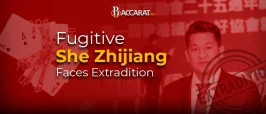Baccarat Cheating Ring Took $1.5M From Casinos in Six States

It is very hard to cheat when playing online baccarat. There is nothing you can do to influence the live dealers or the RNG software that controls the games. However, when playing in a land casino, things are sometimes a little bit different.
A network of baccarat cheaters has been accused of carrying out a complex scam in multiple US states that cost casinos more than $1.5 million between July 2023 and March 2024. Prosecutors in Lake County, Indiana, filed felony charges against six suspects on June 2 and allege that they manipulated games at a minimum of ten casinos in six different states.
The people named in the case, Jianchu Liu, Fuxiang Liu, Qingyong Zhang, Honghui Wu, Daiqi Wang, and Yuhan Hu, began their operation at the Hard Rock Casino in Northern Indiana. Over just six days, they reportedly took over $700,000 there.
According to Lake County Prosecutor Peter Villarreal, “This is one of the most complex cheating operations we’ve ever seen. It combines human error, technical exploitation, and precise teamwork.”
Dealer Errors and Surveillance Blind Spots
The group’s method relied on dealer errors, surveillance blind spots, and advanced coordination. During play, they would manipulate the placement of the cut card, which is used to determine where the dealer should stop dealing cards. By subtly riffling through the shoe when the cut card appeared, they exposed several upcoming cards. Smartphones hidden underneath cigarette packs or baccarat scorecards recorded the cards as they passed by.
The footage would then be reviewed away from the gaming floor, often in restrooms or other discreet locations within the casino, which enabled the team to work out the exact order of the cards left in play. Once this information was known, other team members, wearing concealed earpieces, would return to the table and place large bets, often as high as $20,000, at precisely the right moment to make the most of their knowledge of the remaining deck.
Video surveillance captured key moments of the scam. At Mohegan Pennsylvania casino, for instance, cameras recorded Liu launching a recording app on his phone, darkening the screen, and sliding the device under scorecards to avoid detection. Prosecutors drew attention to the fact that this wasn’t a simple sleight-of-hand operation but rather a well-coordinated effort involving specific roles, technology, and precise timing.
Investigators linked the group not only to the Indiana incident but also to casinos in Illinois, including Bally’s Chicago, where the suspects were eventually barred from entry, as well as venues in Mississippi, New York, Pennsylvania, and California. Combined, the group’s actions are believed to have caused losses of over $1.5 million.
Lake County Prosecutor Villarreal said:
“We believe this group is responsible for similar thefts across multiple states. This was not an isolated incident. This was a true organized crime operation with a clear chain of command and division of labor. It shows how far casino cheats have evolved since the days of basic card counting or simple card marking.”
Careful Selection of Tables and Dealers
Authorities explained that the suspects carefully chose dealers whose handling style they could exploit. They would move between tables and casinos until they found dealers who placed the cut card in a way that left room for manipulation.
The scam has been compared to other infamous casino fraud cases. For example, Phil Ivey’s $16 million “edge sorting” strategy at London’s Crockfords Casino and the Borgata in Atlantic City relied on spotting minute card imperfections. Though Ivey claimed his method was legitimate, courts later ruled that he was cheating. Another case is the Tran Organization, a group that in the early 2000s bribed dealers to perform false shuffles and coordinated bets using hidden earpieces. That operation earned over $7 million across more than 29 casinos.
All six suspects now face charges of cheating at gambling and theft in Indiana. Arrest warrants have been issued, and in Pennsylvania, Jianchu Liu faces additional fraud-related counts.



